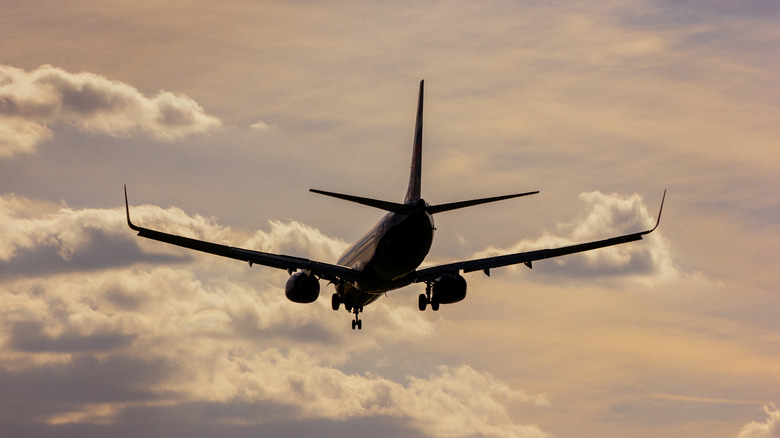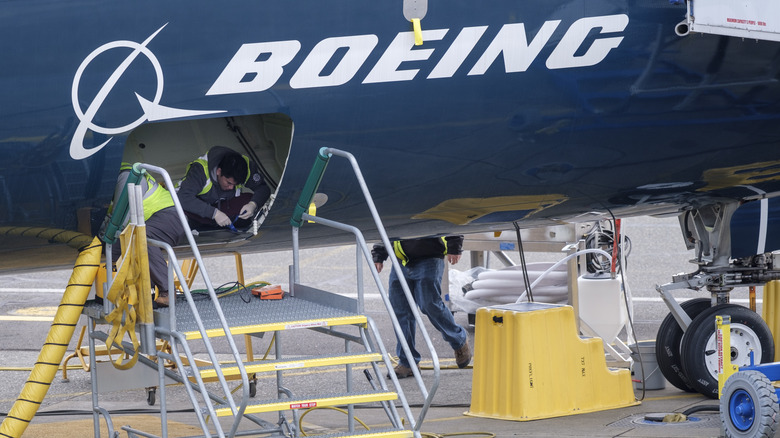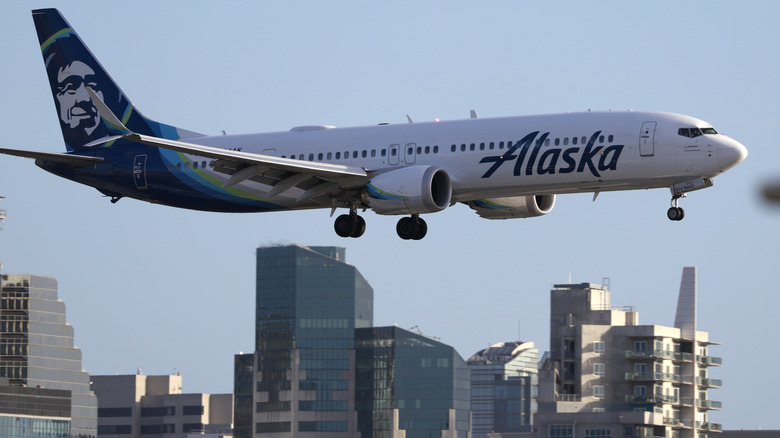The Terrifying Reason Even High-Level Engineers Urge Travelers To Avoid This Type Of Plane
If you follow the news, you may remember a series of tragic aviation emergencies a few years back, all involving the same major aircraft manufacturer. In 2018 and 2019, two Boeing 737 Max 8 aircraft crashed, killing 346 people. Boeing, one of the world's largest and oldest aircraft manufacturers, is back in the limelight again, and the reasons are pretty disturbing.
Another accident occurred on January 5th, 2024, when an aircraft door blew out on Alaska Flight 1282 about 20 minutes after takeoff. The aircraft was none other than the Boeing 737 Max 9, a slightly larger version of the infamous Max 8. Thankfully, the 177 people onboard survived the incident, with some sustaining injuries. Now, the FBI has launched an investigation and identified the passengers as potential victims of a crime. The FAA stopped production of 737 Max airplanes after an investigation by the FAA that found "multiple instances where the companies allegedly failed to comply with manufacturing quality control requirements."
The traveling public is growing increasingly concerned with the safety of flying on a Boeing, and according to experts, the concern is absolutely warranted. Since the Max 8 crashes in 2018, multiple former Boeing employees have stepped forward as whistleblowers, warning about the safety and quality of Boeing 737 Max aircraft. Now, Boeing's CEO is stepping down, and the company is under investigation by multiple government institutions. Some people are even avoiding Boeing planes altogether to feel safer when traveling.
Whistleblowers come forward
In an interview with CNN, Ed Pierson, a whistleblower and former Boeing manager, stated that he refuses to travel on a Boeing 737 Max aircraft together due to safety concerns involved with quality and production issues. Another ex-Boeing employee, an engineer named Joe Jacobson, also warned against the aircraft's safety. "I would tell my family to avoid the MAX," he told the Los Angeles Times. "I would tell anyone, really." Comments like these have understandably caused a lot of flying anxiety.
The most terrifying testimony came from John Barnett, a former quality manager at Boeing's North Charleston production plant. As reported by the BBC, after retiring in 2017, Barnett came forward following the 737 Max crashes saying that workers in the plant were under so much pressure to push planes out on deadline that they used faulty parts, compromising the safety of the aircraft. Unfortunately, John Barnett will never have his long-awaited day in court.
In early March, Barnett was in the process of testifying in Charleston as part of his ongoing legal battle with Boeing. On March 9, 2024, he was to undergo further questioning, but he never showed up. That same day he was found dead, having suffered from "what appears to be a self-inflicted gunshot wound," according to the Charleston County Coroner (via NPR). Law enforcement is in the process of investigating his death, but his lawyers were shocked by the turn of events. In a statement to the press, they said that he was "in very good spirits," adding "No one can believe it."
A history of questionable practices
Boeing has had its hands in the aviation industry since 1916, first founded under the name Pacific Aero Products Company. The company has been dominating the market for generations, creating some of the biggest and fastest jets the world has ever seen. Despite its long history of successful airplanes and its reputation for safe and reliable aircraft, some argue that Boeing's practices have been in decline for years before the MAX airplane issues, claiming that things began to change in the 1990s when the company shifted to a more profit-driven business model after a merger with another aircraft manufacturer, McDonnell Douglas.
The National Transportation Safety Board, The Federal Aviation Administration, and the Justice Department are all investigating Boeing. In early March, the FAA wrapped up a six-week audit of Boeing and its parts supplier, Spirit Aerosystems, after which it decided to halt production of all Max airplanes. Following the tragic incidents and the negative press surrounding Boeing, there are also plans for some major internal changes.
On March 25th, Boeing CEO Dave Calhoun announced that he would bow out at the end of 2024. His right-hand man, Chair Larry Kellner, is following suit. In an email he shared with Boeing employees, he stated that this decision "will result in a number of changes at a management and governance level moving forward." Boeing's Commercial Airplanes President and Executive Officer Stan Deal is also retiring, effective immediately.


